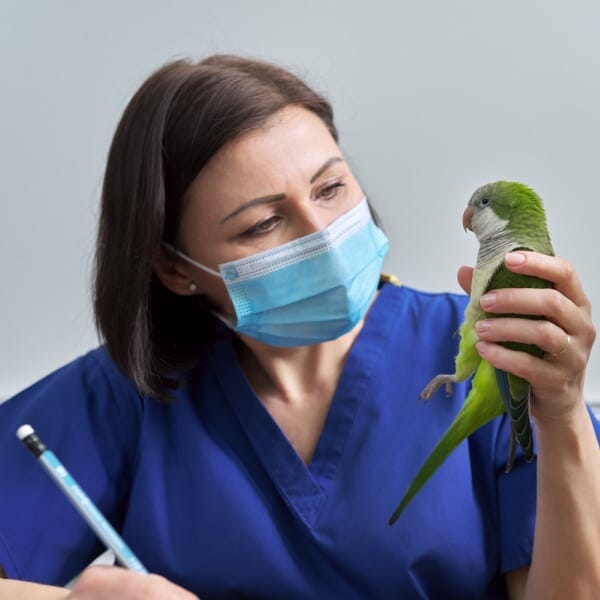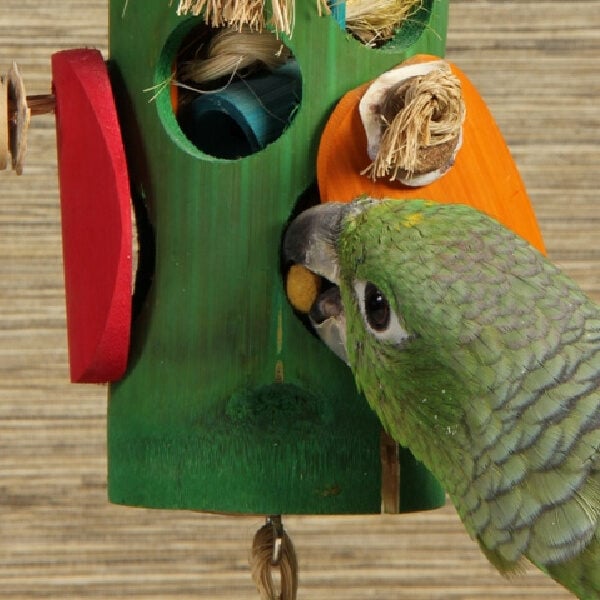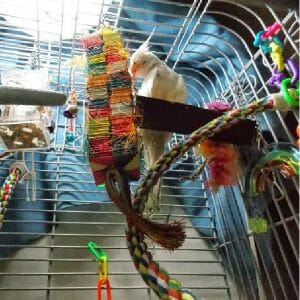Last Updated on by Mitch Rezman
Pet Birds don’t always understand the concept of safe, so it’s up to you to keep them out of harm’s way. For this discussion, we’re going to focus on toxins that can work quickly, or take their time killing your birds.
Look under any kitchen sink or bathroom cabinet and you’ll find it filled with lots of household dangers. If the name on the can or the bottle ends in “Sol” think Pine-Sol or Lysol – don’t use it around your bird, it’s a phenol derivative. You may want to save money by cleaning your birdcage with bleach but bleach gives off chlorine gas which can be deadly.
Spray deodorant, hair spray, and scented candles are bad for birds’ respiratory systems. Even hand lotions have killed birds as well. Hand sanitizer is full of alcohol. Plug-in air fresheners, Febreeze. Ammonia, rubbing alcohol, or even perfume can be deadly. Treated wood and new carpet, and even the cleaner Endust can negatively impact your bird.
That’s a pretty straightforward list of the usual suspects but let’s look at some subtle items that could be mighty interesting to your bird file under simple sugars. The discarded sweet roll Danish or donut. Anything with the glazing, even high sugar fruit cocktail.
The simple sugar problem is when a bird ingests simple sugars these items ferment in the lower bowel and change from an anaerobic (something with oxygen) environment to an anaerobic (something without oxygen) environment.
Most birds have a certain bacteria that is in the small intestines and the bacteria tends to grow quite well under anaerobic conditions which then creates a toxin that causes an illness that can kill your bird in 24 hours unless antibiotics and fluids are administered rapidly.
Speaking of food, let’s look at foods with low pH, low pH means the food is acidic like oranges, raspberries, pineapple, and tomatoes that all can produce symptoms similar to sugar toxicity. It’s thought that when these highly acidic foods are added to the bird’s crop they lower the pH which slows or stops the crop’s normal function as a passageway to further down the gastrointestinal tract.
So what happens is, toxic food byproducts are absorbed into the system which can cause dehydration, regurgitation, depression, and sometimes even death.
This also explains why we are telling people with plucking parrots not to give your bird any citrus/acidic foods or fruit.
Overall birds need more calories than humans relative to their body weight but a third to half of these calories should be made up of high-quality carbohydrates.
Excess fat in birds gets stored in the liver cells or goes back to the bloodstream. If too many fats enter the birds body that can’t be utilized the fat gets stored in the bird’s liver.
If a bird’s liver is overloaded it will gradually degenerate which can cause weakness, paralysis, seizures and even death.
And although it might be cute for your birds to take a sip of beer it’s important to remember birds have the ability to ingest more volume compared to their body weight than humans which means liver failure occurs very quickly.
The brass or bronze coating on metals can be harmful. Anything galvanized, and remember, brighter galvanized metal means there’s more zinc in it. The zinc could be found in costume jewelry and sequins, metal zippers especially the zipper key, loose screws, nuts & bolts.
Iron is certainly bad, which your bird can find in anything like the rust on an old birdcage. Culprits from curtain weights to costume jewelry, ceramics, stained-glass windows, Tiffany lamps, glitter from fancy clothing, and even Christmas ornaments and foils.
Oh, those Swarovski crystals that look so good around your neck contain a good amount of lead. These crystals don’t release lead in the bloodstream so testing won’t detect the lead but your bird can die quickly from internal hemorrhaging and the only way to fix this would be to surgically remove them once they’re identified via x-ray
Speaking of pits, in 1989 it was proven beyond a shadow of a doubt that avocados are toxic to birds and they can die within a couple of days after just one drop from avocado paste diluted in water. Avocados will cause kidney failure in birds so it’s just best not to have any avocados in your house if your bird is out of its cage and roams.
I never understood growing up why I wasn’t allowed to play with fire or sharp objects unless of course, I was in the kitchen. Kitchens are a bad place for birds if you’re doing cooking of any sort.
Thank you for being a subscriber,
Approved by Catherine Tobsing
Author Profile
Latest entries
 Feeding Exotic BirdsDecember 29, 2025How to Switch or Convert Your Bird From Seeds to Pellets: Real-Life Case Studies and Practical Guidance
Feeding Exotic BirdsDecember 29, 2025How to Switch or Convert Your Bird From Seeds to Pellets: Real-Life Case Studies and Practical Guidance Feeding Exotic BirdsDecember 16, 2025A Practical, Budget-Smart Guide to Feeding Birds Well
Feeding Exotic BirdsDecember 16, 2025A Practical, Budget-Smart Guide to Feeding Birds Well Bird EnviornmentsDecember 7, 2025Understanding Budgie Cage Bar Orientation: Myths, Realities & Practical Solutions for Vertical-Bar Bird Cages
Bird EnviornmentsDecember 7, 2025Understanding Budgie Cage Bar Orientation: Myths, Realities & Practical Solutions for Vertical-Bar Bird Cages Feeding Exotic BirdsDecember 5, 2025How Dr. T.J. Lafeber Rewrote the Future of Pet Bird Nutrition
Feeding Exotic BirdsDecember 5, 2025How Dr. T.J. Lafeber Rewrote the Future of Pet Bird Nutrition



